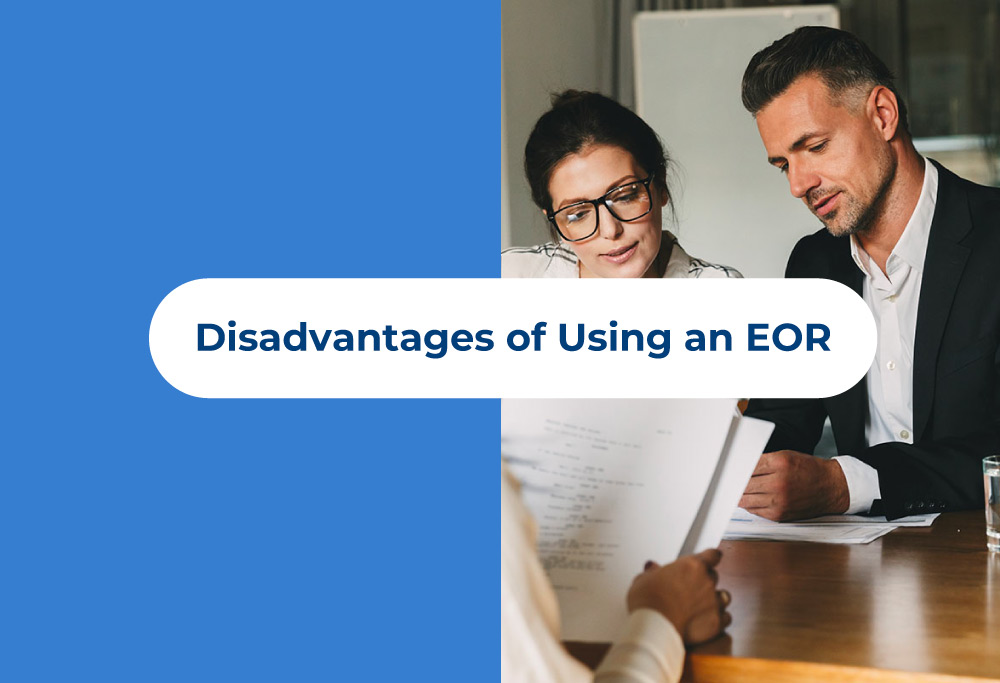Employers of Record (EORs) provide an essential service for businesses looking to expand their global footprint without establishing a legal entity in every country they operate in. They handle employment-related responsibilities, including payroll, employee benefits, payroll taxes, and compliance with local labor laws. However, while EORs offer numerous advantages, there are also risks and potential disadvantages of an EOR to consider.
How Can the Use of an EOR Potentially Lead to Compliance Issues?
One of the most significant risks when using an EOR is related to compliance with local labor laws and regulations. Each country has its own set of business operation and employment laws, and staying compliant is crucial to avoid legal penalties and reputational damage.
In 2019, Uber faced significant legal challenges related to worker classification in the UK. While the company wished to classify its workers as self-employed, it was decided that this was not true, and Uber was required to change the way it hired and managed drivers, demonstrating how rapidly changing labor laws can seriously impact businesses using third-party employment services.
While EORs specialize in navigating these complexities, there is still a risk that they may overlook specific local nuances or changes in regulations. For instance, a country may introduce new employment legislation that makes it harder or impossible to enter certain types of co-employment relationships. If the EOR fails to adapt promptly, the client business could face fines or other legal consequences.
Businesses working with EORs should ensure their EOR has a strong track record of compliance and a deep understanding of the local legal landscape. Beyond the EOR being able to demonstrate experience with working in a particular market, regular audits and reviews of the EOR’s compliance processes mean you can also help maintain adherence to local laws.

Tired of scrolling? Download a PDF version for easier offline reading and sharing with coworkers
What Are the Risks Associated with Losing Direct Control of Employees When Using an EOR?
When a company uses an EOR, it essentially outsources a significant portion of its HR function management. While this doesn’t affect day-to-day job performance and oversight, it can lead to a loss of direct control over employees if the EOR isn’t able to communicate effectively. The EOR becomes the legal employer, and this intermediary role can sometimes create barriers and slow decision-making processes, especially if the employee is uncertain of the role each party plays.
For example, if an issue arises with an employee’s performance or behavior, the company might find it challenging to address the problem swiftly due to having to go through the EOR. Companies should establish clear communication channels and protocols with their EOR to address this, bringing the employees into these decisions so they are fully aware of who to talk to in any given situation. Regular meetings and updates can help ensure that the client company remains informed and involved in key HR decisions.
How Can Variability in the Quality of Service Provided by Different EORs Impact a Business?
Unfortunately, the quality of service provided by EORs can vary significantly. As this is an evolving field, while some EORs may offer exceptional service with a high level of expertise, others might fall short of expectations.
In recent years, there has been an explosion of EOR service providers aiming to take advantage of accelerating globalization through new digital tools or largely automated processes. However, trusting the wrong EOR can lead to big problems.
A bad EOR might manage payroll benefits poorly or fail to provide adequate support to employees. Such issues can lead to employee dissatisfaction and potential legal troubles. EORs that trust largely automated processes or large teams that deal with hundreds of clients at once can also lead to poor service quality that leaves clients feeling abandoned or less of a priority.
That’s why businesses should conduct thorough due diligence when selecting an EOR, looking for experience and expertise in the specific countries or industries required before anything else. This includes checking references, reading reviews, and assessing the EOR’s fit with established company structures and needs.
What Potential Data Security Risks Might Arise When Sensitive Employee and Company Information Is Handled by an EOR?
When an EOR handles sensitive employee and company information, data security becomes a critical concern that may not be properly addressed until it’s too late.
In these cases, the EOR will have access to personal employee data, financial information, and other confidential details. As a result, any data breach or security lapse can have severe consequences for you and your employees, including financial loss, legal penalties, and damage to the company’s reputation.
In 2023, a major data breach at a payroll service provider exposed the personal data of thousands of employees in some of the UKs largest companies including the BBC. Extremely sensitive data, including tax information, was stolen because of the wrong security measures, highlighting the potential risks associated with third-party data handling.
Businesses should ensure that their EOR has robust data security measures in place before any data is entrusted to them. Thankfully, today, more and more international systems are being put in place to regulate data protection, but at a company level, secure data storage, encryption, regular security audits, and compliance with data protection regulations such as GDPR must be paramount.
What Hidden or Unexpected Costs Might a Company Incur When Engaging with an EOR?
While using an EOR can be cost-effective compared to setting up a legal entity in a foreign country, there can be hidden or unexpected costs if the service provider doesn’t properly provide a clear breakdown of potential costs upfront. These may include fees for additional services, currency exchange rate fluctuations, or unexpected legal fees due to compliance issues.
That’s why companies should always take the time to get a clear understanding of an EOR’s fee structure and any potential additional costs. Transparent communication and a detailed contract outlining all fees can help avoid surprises and manage the budget effectively.
How Can the Use of an EOR Affect Employee Loyalty, Engagement, and Alignment with the Company’s Culture?
Related to issues of control over co-employed workers, one other potential disadvantage of using an EOR is the impact on employee loyalty and alignment with the company’s culture.
Employees hired through an EOR might feel disconnected from the parent company if improperly briefed on the situation or not well-integrated into a company’s management structure, leading to lower engagement and loyalty.
Cultural differences can also play a role. An unprepared EOR might not take the time to fully understand the company’s culture and values, making it challenging to integrate these into the local employment practices. Research has shown that employees who feel a strong connection to their company’s culture are more engaged and productive, which can be compromised when using an EOR.
To mitigate this, businesses should work closely with their EOR from day 1 to ensure that the company’s values are communicated effectively and not just the needs.
Once employees are onboarded to the EOR, regular team-building activities with your existing employees, clear communication of the company’s mission and vision, and involving employees in decision-making processes can help bridge the gap.
What Challenges Might a Company Face When Terminating the Relationship with an EOR and Transitioning Employees Back to Direct Employment or Another EOR?
Ending a relationship with an EOR and transitioning employees back to direct employment or to another EOR can be challenging, but it’s often a necessary move or a natural next step. Legal and logistical hurdles in this process may include transferring employment contracts, handling severance packages, and ensuring compliance with local labor laws.
This transition can be particularly complex if the EOR has not maintained clear and organized employee records, and any missteps during this process can lead to legal disputes and employee dissatisfaction.
On the other hand, the right EOR service provider will know that transferring employees to your own direct control through a new local company entity is the logical next step for companies thinking about long-term expansion. As a result, they can offer valuable assistance to make this move easier, not harder. Making a transfer plan from the very beginning of the relationship should be part of the service establishment process.
This plan should include clear timelines, responsibilities, and legal considerations. Working closely with legal and HR experts throughout contract formation and any eventual transfer process can also help ensure a smooth transition.
How Are Employment Disputes or Grievances Managed When an EOR Is Involved, and What Complications Can Arise?
Employment disputes or grievances are inevitable in any workplace, though when an EOR is involved, resolving these issues can sometimes become more complicated. The EOR, being the legal employer, will typically be involved in handling disputes. Still, their approach might not always align with the company’s values or policies, and the wrong involvement can muddy the waters at just the wrong time.
Additionally, the involvement of multiple parties can slow down the resolution process, leading to prolonged dissatisfaction among employees. Issues with unclear liability can cause delays and legal complications in resolving employee grievances because the EOR may have different protocols for handling disputes.
To address this, companies should establish clear dispute resolution protocols with their EOR. This includes defining the roles and responsibilities of each party and ensuring that the EOR’s approach to dispute resolution aligns with the company’s values and policies.
How Might Using an EOR Affect the Company’s Employer Branding and Reputation in the Job Market?
A recent survey showed that 75% of job seekers consider an employer’s brand before even applying for a job, highlighting the importance of maintaining a positive image.
However, using an EOR can have implications for a company’s employer branding if the relationship isn’t disclosed honestly or adequately. Potential candidates and employees might perceive the company differently if they know that a third party manages their employment. Unfortunately, this perception can affect the company’s ability to attract and retain top talent.
Moreover, any negative experiences with the EOR can reflect poorly on the company, even if the issues were outside its control.
To avoid this risk, businesses should ensure that their EOR provides a high-quality experience for employees from the beginning. This may mean bringing the EOR into any discussions with potential employees and letting them offer paths to clear communication about the role of the EOR and the company’s commitment to employee well-being.
What Risks Are Associated with Becoming Too Dependent on an EOR for Workforce Management, and How Can This Affect Business Flexibility and Strategic Decisions?
Relying too heavily on an EOR for workforce management can create strategic risks for a business if it’s only seen as a way to avoid necessary employer responsibilities.
EORs can help to streamline day-to-day operations overseas, but over-dependence can limit a company’s flexibility and ability to make swift decisions as, if the EOR faces financial difficulties, legal issues, or any other operational challenges, the company’s operations can be significantly impacted as a result.
In order to avoid over-dependence, businesses should regularly assess their reliance on the EOR and consider diversifying their approach to workforce management. This might include creating long-term expansion strategies to establish legal entities in key markets over time or finding EORs that will tailor their services to only specific necessary functions.

Is an EOR Right for You? How You Can Learn More About the Potential Advantages and Disadvantages
While Employers of Record offer valuable HR services for businesses looking to expand internationally without the complexity of setting up local entities, it is essential to be aware of the potential risks and disadvantages that come with such a decision. EOR services aren’t a one-size-fits-all solution to all the issues of expansion, but by carefully considering these factors and taking proactive steps to mitigate them, businesses can more effectively leverage the pros and cons of an EOR.
INS Global has been a provider of HR and payroll outsourcing services since 2006, offering world-class support to businesses considering the next stage in their expansion strategy in 160+ countries. We understand the risks and dangers that come with making the decision to expand, and whether your company is a startup or already a multinational, we can help you take the next step and streamline your global footprint.
Take the time to learn more about EOR services, speak to our team of experienced expansion and compliance experts today, and see if they’re right for you.

SHARE